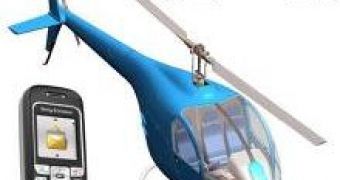The European Commission is the primary financer of a project called MARIUS, that will enable temporary mobile networks to be set up in hard-to-reach locations during emergencies, thus trying to aid in organizing rescue efforts in a crisis zone.
The nice thing about this is that, even if you are in an area with no network coverage, thanks to this technology, rescue teams will still be able to send you SMS and let you know that you're in danger.
The project is named MARIUS which is short for "Mobile Autonomous Reactive Information System for Urgency Situations" and the main purpose of the project is to develop a pre-operational autonomous Command Post that can be deployed as quickly as possible to manage every type of crisis.
One of the companies that have been contracted as a part of the project, Swapcom, has announced that helicopters with on-board mini-mobile networks will be used to facilitate communication.
While the mini-networks won't be able to carry mobile phone calls, they will however work with SMS text messages that can be sent en masse by authorities and rescue teams to the population at risk.
Therefore, with the help of MARIUS-equipped helicopters, if something catastrophic is about to happen, all of the people in the area can be notified immediately, even if they are in an area where standard cellular networks are unavailable.
The project is mostly financed by the European Union and the laboratory testing was completed in December 2006. The system hasn't been tried in the field so far, but it is expected to be tested outside the lab by July 2007 in Valencia, Spain.

 14 DAY TRIAL //
14 DAY TRIAL //